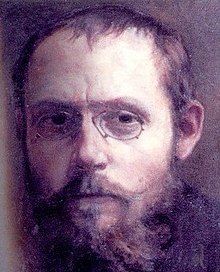Charles Peguy
| Charles Péguy | |
|---|---|

Portrait of Charles Péguy, by Jean-Pierre Laurens, 1908
|
|
| Born | Charles Pierre Péguy 7 January 1873 Orléans, France |
| Died | 5 September 1914 (aged 41) Villeroy, Seine-et-Marne, France |
| Occupation | Writer |
| Nationality | French |
| Alma mater | École Normale Supérieure |
Charles Pierre Péguy (French: [ʃaʁl peɡi]; 7 January 1873 – 5 September 1914) was a noted French poet, essayist, and editor. His two main philosophies were socialism and nationalism, but by 1908 at the latest, after years of uneasy agnosticism, he had become a believing but non-practicing Roman Catholic. From that time, Catholicism strongly influenced his works.
Péguy was born to poverty in Orléans. His mother Cécile, widowed when he was an infant, mended chairs for a living. His father, Désiré Péguy, was a cabinet maker, who died in 1874 as a result of combat wounds. He studied at the Lycée Lakanal in Sceaux, winning a scholarship at the École Normale Supérieure, where he attended notably the lectures of Henri Bergson and Romain Rolland, whom he befriended. He formally left the École Normale Supérieure, without graduating, in 1897, even though he continued attending some lectures in 1898. Influenced by Lucien Herr (librarian of the École Normale Supérieure), he became an ardent Dreyfusard.
In 1897, at age 24, Péguy married Charlotte-Françoise Baudoin; they had one daughter and three sons, one of whom was born after Péguy's death. Around 1910 he fell deeply in love with Blanche Raphael, a young Jewish friend, however he was faithful to his wife.
From his earliest years, he was influenced by socialism. In 1895 Péguy joined the Socialist Party. From 1900 to his death in 1914, he was the main contributor and the editor of the literary magazine Les Cahiers de la Quinzaine, which first supported the Socialist Party director Jean Jaurès. Péguy ultimately ended his support after he began viewing Jaurès as a traitor to the nation and to socialism. In the Cahiers, Péguy published not only his own essays and poetry, but also works by important contemporary authors such as Romain Rolland.
...
Wikipedia
